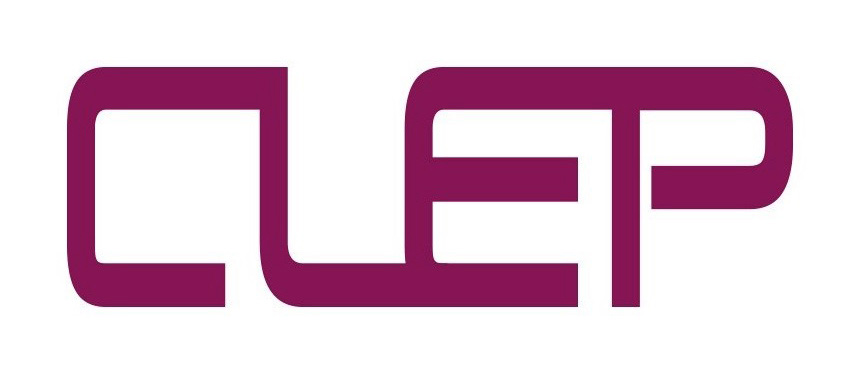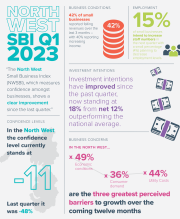Cost of living crisis curbs returning North West small business confidence
North West small business confidence is lagging behind the UK average as the cost-of-living crisis undermines rising optimism in the region, according to the latest quarterly data from the Federation of Small Businesses (FSB).
The FSB’s North West Small Business Index (SBI) remains negative in Q1 2023 at -11. While this is a significant improvement on the -48 score recorded in the previous quarter, confidence remains low - tracking behind the national average of -3.
Small businesses in the North West continue to face the ongoing impact of economic uncertainty and inflationary pressures. General economic conditions (49%), utility costs (43%), and consumer demand (36%) are the greatest perceived barriers to growth in the North West over the next 12 months. Utility costs have notably grown as a concern for businesses in the region, compared to the previous quarter, with 27% citing this as a considerable issue.
Overall, 42% of small businesses in the North West reported a decrease in revenue over the past three months. However, there are some signs of resilience – a total of 40% reported revenue increases during the period.

Holly Bonfield, FSB North West Regional Chair, said: “It is welcome that North West small business confidence has turned the corner and rebounded strongly from the previous quarter, but it is still in negative territory and lags worryingly behind the UK average.
“There are dark clouds on the horizon – such as the prospect of further interest rate rises, access to finance issues and, of course, increasing utility costs – which threaten to undermine these green shoots of recovery.
“The withdrawal of the Energy Bill Relief Scheme leaves a group of small firms exposed to high prices in fixed-rate contracts from last year unable to negotiate a new contract – due to a standoff between energy companies and Government. Utility bills were still cited in our survey as a driver of inflation and a barrier to growth, despite the EBRS only closing at the end of the first quarter.
“Small businesses have shown incredible grit and determination in the face of adversity. FSB’s latest research provides a glimmer of hope that things are looking up in the North West so it's important that all businesses are effectively supported to allow them to realise their potential, overcome the challenges we have outlined, thrive, and grow.”
According to the SBI research for Q1, future revenue prospects are positive - a net balance of 22% expect growth in profits for the coming quarter. This shows a huge uplift in outlook from Q4 2022, when the net balance stood at -25%, and is the first positive revenue outlook reported in the North West since Q1 2022. Revenue outlook for Q1 2023 in the North West is also more positive than the net national average (which is 13%).
Growth and Investment aspirations
In Q1 2023, just over half (51%) said that their growth aspirations in the next 12 months were to grow either rapidly (increase turnover/sales by over 20%) or moderately (up to 20%). This is on par with the previous quarter (49%).
The investment intentions for North West small businesses have improved, standing at net 18% from the net 12% recorded in Q4 - outperforming the nationwide average in Q1 (net 2%). A third (33%) expect to increase investment levels in the coming quarter, compared to 23% nationwide. Ultimately, investment intentions in the North West continue to perform well compared to other regions, as several anticipate stagnant investment (East Midlands; net 0%) or falling investment (London; net -13%).
North West small businesses moderately grow headcount, with a net growth in staff levels for Q1 2023 (2%).
The employment picture over the preceding three months showed that 11% had decreased and 13% had increased staff numbers. Most small businesses in the region have had no change in staffing levels in Q1, with over two-thirds (70%) reporting headcount had stayed the same. The net change in headcount of 2% in the North West is marginally higher than the respective net score nationwide, which stands at -1%. It is also the first net positive figure since Q2 2022.
For the next quarter, the intention in the North West is for 15% of businesses to increase headcount and 4% to decrease headcount.
Holly Bonfield said: “Our recent ‘An Entrepreneurial North’ report identifies the barriers to business growth and reducing regional inequalities across the north of England.
“We are urging councils and political leaders in the North West to heed the report and our SBI findings, stand up and show local leadership where small businesses are concerned, including when making UK Shared Prosperity Fund allocations. We’re also asking national government to put entrepreneurship at the forefront of policy making and take seriously importance of small businesses in the north to driving levelling up ambitions.”
About FSB
As experts in business, FSB offers members a wide range of vital business services, including advice, financial expertise, support and a powerful voice in Government. Its aim is to help smaller businesses achieve their ambitions. More information is available at www.fsb.org.uk. You can follow us on twitter @fsb_policy and @FSBLancsCumbria.



